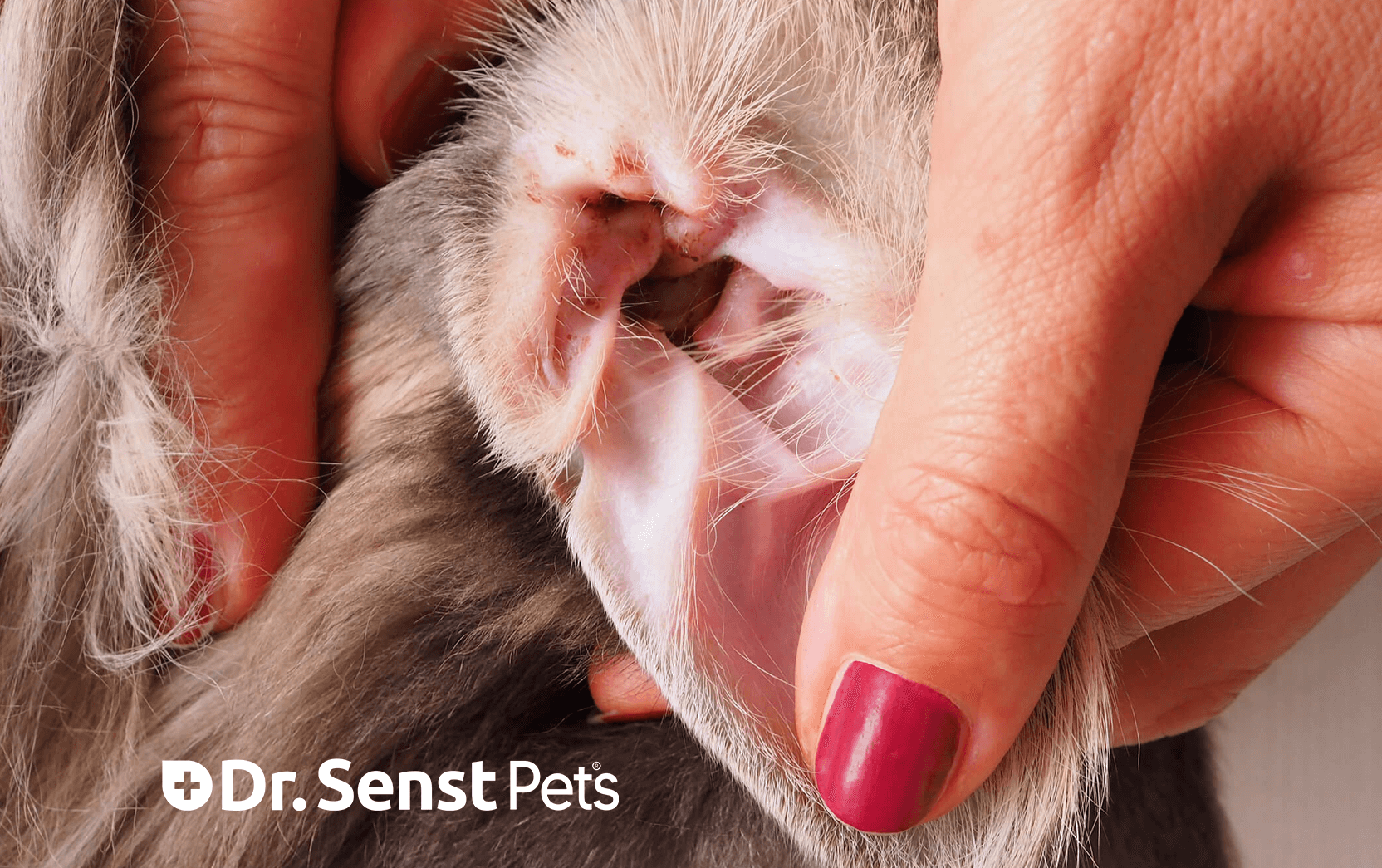
- by Dr.Thilo Senst
Cat Itchy Ears: Causes, Symptoms, and Vet-Approved Solutions
- by Dr.Thilo Senst
Ear Itching in Cats: Common Causes and Solutions
Ear itching is a frequent concern for many cat owners. Cats are naturally fastidious creatures, and when their grooming habits focus excessively on their ears, it can indicate an underlying problem. While occasional scratching is normal, persistent ear itching or rubbing can signal an issue that requires attention.
Ear itching may stem from a range of causes, including ear mites, allergies, or infections. It is essential to recognise these causes early on, as untreated ear problems can lead to pain, discomfort, and more severe health issues. In this guide, we’ll explore the common causes of cat itchy ear, effective treatments, and tips for prevention.
Understanding why your cat is scratching its ears is the first step toward finding an effective solution. Below are some of the primary reasons cats experience itchy ears.
One of the most prevalent causes of ear itching in cats, especially among outdoor cats, is ear mites. These tiny parasites feed on the oils and wax in the cat’s ear canal, causing intense itching. Signs of an ear mite infestation include:
A study conducted by the PDSA (People’s Dispensary for Sick Animals) found that ear mites are more common in outdoor and rescue cats, with nearly 30% of cats affected at some point in their lives.
Cats, like humans, can develop allergies. Allergens such as pollen, dust, certain foods, and household chemicals may trigger itching and discomfort. If a cat’s itchy ears accompany symptoms like watery eyes, sneezing, or skin redness, allergies could be the culprit.
Bacterial or fungal ear infections can result from moisture build-up, foreign particles, or trauma. Infections often cause a foul smell, discharge, and persistent itching. Vets estimate that approximately 15% of UK cats will experience an ear infection at some point, particularly those with existing allergies or a history of ear mite infestations.
Outdoor cats are more likely to get debris, dirt, or even small foreign objects like grass seeds trapped in their ears. These irritants can cause itchiness and discomfort, prompting the cat to scratch or paw at the ear.
An aural haematoma is a blood-filled swelling within the ear flap, typically caused by injury from excessive scratching or head-shaking. While it is not a direct cause of itchiness, a haematoma can result from prolonged ear scratching due to an underlying issue.
Recognising the signs of ear irritation early can make a significant difference in treatment outcomes. Common symptoms to watch for include:
If your cat shows signs of persistent ear itching, it’s essential to consult a veterinarian for a proper diagnosis. While mild itching may be treatable at home, conditions like ear infections or severe mite infestations require professional care. During an examination, your vet may:
There are several effective treatments for managing cat itchy ears, ranging from at-home remedies to veterinary treatments.
Vet-approved ear drops and cleaners can relieve itching, reduce inflammation, and eliminate mites or bacteria. For example:
If ear mites are the culprit, anti-parasitic ear drops and topical treatments specifically target these pests. Be sure to select a treatment formulated for cats, as some dog products may contain ingredients harmful to felines.
For cats with allergies, managing their exposure to allergens is critical. Allergy treatments may include:
Some mild cases of cat itchy ear can benefit from gentle home remedies. These include:
Proactive ear care not only keeps your cat comfortable but also prevents conditions from worsening. Here’s why early intervention is key:
Think of ear itching in cats as similar to having dust in your eye. When dust gets in, you instinctively want to rub it, but doing so can worsen the irritation. Likewise, cats with itchy ears may scratch excessively, which can exacerbate the problem and lead to further complications. Just as you would rinse out your eye to remove the dust, cleaning your cat’s ears and treating the root cause can provide relief and prevent additional issues.
For most cats, monthly cleaning is sufficient. However, if your cat has a history of ear issues or mites, you may need to clean them more frequently.
No, human ear drops may contain ingredients harmful to cats. Always use ear drops specifically formulated for cats.
If the itching persists despite treatment, consult your vet. Chronic itching can indicate an underlying issue that requires professional care.
Yes, breeds with shorter ear canals or flat faces, like Persians, may be more prone to ear issues and require regular ear maintenance.
Incorporating regular ear care into your cat’s routine can help manage and prevent itchy ear problems. Here are some recommended Dr. Senst products to support ear health:
With these solutions, you can help ensure that your cat’s ears stay healthy, itch-free, and comfortable.
![]()
Enter your details & download our comprehensive 50+ page printable Dr. Senst Pet Care Planner completley FREE! - keep track of all your pet’s needs, from medical history and training to vet visits, grooming, diet, and more!










Share:
Essential Cat Training Techniques & Tips for Success
Top Vet-Recommended Cat Eye Cleaners for Clear, Healthy Eyes